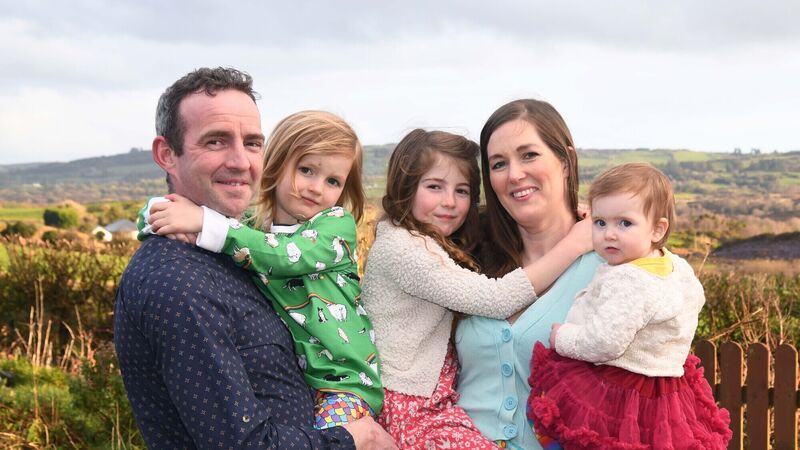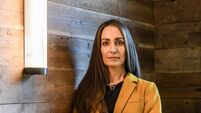Couple's joy at forming a family despite nine miscarriages

Con, Emma, Mila, Oscar and Sienna Lucey at the home in Inchigeelagh, Co Cork. Picture: Denis Minihane
The garden of the Lucey family in Inchigeelagh, County Cork, is full of little plants to honour the nine babies that might have been but were lost in miscarriages.
Con Lucey says that he and his wife, Emma, consider themselves to be blessed to have three children, Mila (7), Oscar (4) and Sienna (one) but "that doesn't take from the loss of the others."
Lucey (40) is one of the participants in The Re: Current Study, a national project led by Professor Keelin O'Donoghue, consultant obstetrician at CUH. The project is evaluating recurrent miscarriage services in Ireland to improve the quality of the services on offer for people who have experienced pregnancy loss.
The Luceys suffered six miscarriages before Mila was born. They had another three miscarriages between the births of Oscar and Sienna. The miscarriages occurred between seven and thirteen weeks.
Lucey admits that he was never tuned in to the possibility of miscarriages, despite the fact that one in four pregnancies ends in miscarriage. "Then, when it happens, you're in crisis mode straightaway. When it happens again, it's worse."
Lucey says that he and his wife have had a long journey in forming a family.

"Miscarriage is kind of unknown. There wasn't any investigative work on our miscarriages."
But Lucey is keen to contribute his lived experience to the study. When it comes to miscarriage, "men are often forgotten about or are indirectly forgotten. I suppose I took on the role of keeping everything together. My wife is great. It was she who got me involved in the project which she saw advertised on social media. Men were being invited to take part. At the time, we were dealing with our ninth miscarriage so I thought it was a bit heavy to be honest.
"But I said I'd get involved as a kind of therapy for myself. I thought I'd try it once. When I went to one of the meetings, I spoke straight away. I could see the validity of what the study was going to be, what it was trying to do. Its aim, to improve services, is very commendable. I got into it and felt included on an equal basis. That makes the study very accurate."
Speaking about miscarriage from the male perspective is now something that Lucey feels comfortable with.
"If I knew someone, having a conversation with them about miscarriage would be no trouble. Knowing it's ok to talk is good and it's also good to get support while still supporting your family to get through it all. It's important to check in on yourself too."
There are two specialists in bereavement and loss services at CUMH. Lucey feels this service is underfunded.
"Emma went to one of the specialists but I didn't feel it was my place to go. But now I would. But the resources just don't seem to be there. They definitely weren't there when we were going through (miscarriages)."
He spoke to bereavement specialist, Anna Maria Verling at the hospital in the corridor. "Emma would have had a couple of phone calls with her. It was my own choice not to (receive counselling)."
While Lucey agrees that men find it harder to talk about their emotions, he has been learning to open up thanks to the study.
"At the beginning, it was women who have miscarriages. Now it's men and women. That subtle change in language will, in my opinion, hopefully, help to get rid of the taboo around miscarriage. With two of our miscarriages, there were heartbeats in one scan and then back again soon after, for another scan, there were none.
"That was a blow. It has been a rollercoaster journey. We would be in bits. It was awful. But it's so common. Once I got involved in the group, there were so many people that you never knew had recurrent miscarriages. People just don't talk about it much."
Asked what would help the services from his experience, Lucey describes what happened when his wife had a miscarriage.
"Once there was a miscarriage, we were assigned to the high-risk clinic in CUMH for any other pregnancy. Looking back, it was almost cruel although that was not intentional. You go into a waiting area with people who are all nervous about their scans. They're all high risk. Once we were called in, most of the time we got bad news.
"We were emotionally wrecked. But we had to make a follow-up appointment so it was back to the waiting area where the other ladies and couples are nervous. You had to wait to see a consultant. You were put behind a curtain and given a couple of pamphlets on miscarriage. You try to understand what's happening. Then a consultant arrives to talk to you about the next step.
"A lot of the time, you have to actually miscarry so the women is offered medication to bring on miscarriage. But every time we were in the high risk clinic, we had a different consultant. There wasn't a consistent team working with us. So with Emma, she'd be asked the same questions about the miscarriages again and again. Sometimes, different departments at CUMH didn't seem to be linked up so they wouldn't have information about you. You're repeating the story over and over. We found that hard."
Lucey says that in an ideal world, with adequate funding, a bigger waiting area would be provided and the couple would see the team that is familiar with their history. Lucey appreciated seeing Anna Maria Verling, "a familiar face".
As a result of his involvement with the study, Lucey says that if his son was to "be in the unfortunate position of having a miscarriage, it would be easier to talk to him about it. It will be a more normal topic to discuss".
Lucey says that recurrent miscarriages can adversely affect a relationship.
"We're ok, but at the time, Emma had the physical and emotional thing to go through and hadn't time for me. That's ok, but it can put a strain on the relationship. It takes so long to physically recover alone from a miscarriage and then there's the emotional side of it."
While the birth of his children was a source of "elation, you can't take away from the loss we went through. That has to be acknowledged."












